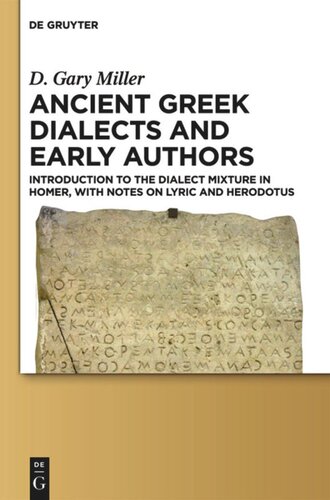

Most ebook files are in PDF format, so you can easily read them using various software such as Foxit Reader or directly on the Google Chrome browser.
Some ebook files are released by publishers in other formats such as .awz, .mobi, .epub, .fb2, etc. You may need to install specific software to read these formats on mobile/PC, such as Calibre.
Please read the tutorial at this link: https://ebookbell.com/faq
We offer FREE conversion to the popular formats you request; however, this may take some time. Therefore, right after payment, please email us, and we will try to provide the service as quickly as possible.
For some exceptional file formats or broken links (if any), please refrain from opening any disputes. Instead, email us first, and we will try to assist within a maximum of 6 hours.
EbookBell Team

4.0
6 reviewsEpic is dialectally mixed but Ionic at its core. The proper dialect for elegy was Ionic, even when composed by Tyrtaeus in Sparta or Theognis in Megara, both Doric areas. Choral lyric poets represent the major dialect areas: Aeolic (Sappho, Alcaeus), Ionic (Anacreon, Archilochus, Simonides), and Doric (Alcman, Ibycus, Stesichorus, Pindar). Most distinctive are the Aeolic poets. The rest may have a preference for their own dialect (some more than others) but in their Lesbian veneer and mixture of Doric and Ionic forms are to some extent dialectally indistinguishable. All of the ancient authors use a literary language that is artificial from the point of view of any individual dialect. Homer has the most forms that occur in no actual dialect.
In this volume, by means of dialectally and chronologically arranged illustrative texts, translated and provided with running commentary, some of the early Greek authors are compared against epigraphic records, where available, from the same period and locality in order to provide an appreciation of: the internal history of the Ancient Greek language and its dialects; the evolution of the multilectal, artificial poetic language that characterizes the main genres of the most ancient Greek literature, especially Homer / epic, with notes on choral lyric and even the literary language of the prose historian Herodotus; the formulaic properties of ancient poetry, especially epic genres; the development of more complex meters, colometric structure, and poetic conventions; and the basis for decisions about text editing and the selection of a manuscript alternant or emendation that was plausibly used by a given author.